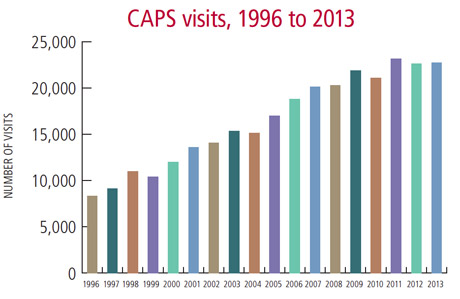Mental health efforts earn Cornell national recognition
By Diane Lebo Wallace and Jennifer Austin
Cornell’s comprehensive campuswide approach to mental health has earned it the JedCampus Seal, an honor awarded by the Jed Foundation, a national organization seeking to reduce suicide rates among college students. Cornell is among the nation’s first universities to earn the distinction.
“Cornell stands out as a leader in campuswide mental health programming,” the foundation noted in its assessment. “This is not unexpected as your institution has been historically at the forefront of mental health services and programming.”
Says Gregory Eells, director of Counseling and Psychological Services at Gannett Health Services: “Cornell takes mental health very seriously and has prioritized it for students for decades. Earning the JedCampus Seal is an acknowledgment of that work.”
The foundation used seven criteria: assessing the level at which institutions help students develop life skills, restrict access to potentially lethal means, follow crisis management procedures, provide mental health services, promote social connectedness, identify students at risk and increase help-seeking behavior. Cornell excelled in all categories.
According to the Jed Foundation, 21 percent of college students received a psychiatric diagnosis or were treated for mental health issues such as depression or eating disorders in the past year, and an estimated 6.6 percent of students reported having had serious thoughts of suicide.
Looking at more than two decades of data, Eells says Cornell’s student suicide rate is on average or slightly below that of other universities. Visits to Cornell’s counseling services have tripled since 1996.

“This award reflects a lot of people’s efforts across campus,” says Janet Corson-Rikert, M.D., executive director of Gannett Health Services and associate vice president for campus health. “I’m really proud of the way our campus community works together. As an institution, we’ve worked hard to cultivate a truly comprehensive model that allows for innovative collaboration and support from administration, faculty, staff and student groups.”
Eells notes that campus leadership on mental health starts with President David Skorton, who encourages students to learn when to ask for help. “His message and those from other top campus leaders help students understand that they do not need to suffer or struggle through life’s challenges alone,” Eells says. “Everyone needs help from time to time. At Cornell we have cultivated a caring community in which individuals are encouraged to intervene on another’s behalf and to ask for help when they need it.”
Finding ways to reach people who are reluctant to seek help is a key challenge, according to Eells. Gannett works with others on campus to lower the barriers to care and reduce the perceived stigma of requesting help for emotional challenges.
“Let’s Talk,” for example, offers confidential, walk-in counseling services to students where they study and live. “Real Students, Reel Stories” introduces new students to campus health and well-being resources through video interviews with Cornell students who share their challenges and triumphs. Other efforts, such as the Community Consultation and Intervention service and campus Notice and Respond programs, empower faculty, staff and student peers to help others.
Of the Notice and Respond programs Eells says: “They have changed a lot of people’s perspectives on how they fit into the community and what their responsibilities are to others. You don’t have to be a therapist to help. You just have to be a caring person, notice that someone is suffering and be able to share some information and resources.”
Corson-Rikert emphasizes that Cornell will strive to expand on its successes. “While we are busy maintaining our efforts, we continue to consider how we might build on this foundation of strength,” she says.
Diane Lebo Wallace is a writer for Student and Academic Services, and Jennifer Austin is a communications specialist at Gannett.
Media Contact
Get Cornell news delivered right to your inbox.
Subscribe